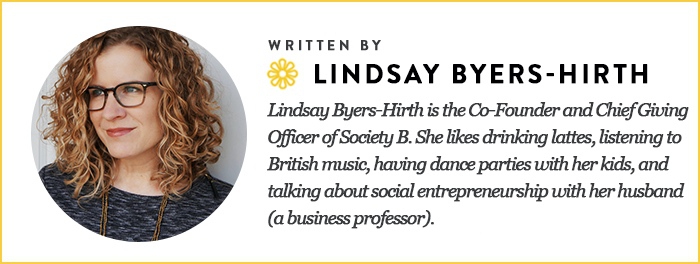_ [
[
](https://yellow-blog-images.imgix.net/2016/03/MG_8397-66.jpg)“I wish it were easier to find social businesses—truly good businesses—that make a difference, rather than make rich shareholders richer.”_
That was the thought that inspired me to start my own social business, Society B, connecting causes and the best products that give back to make a difference in people’s lives.
But as I discover and add more brands to our marketplace of good, this process of sorting through the truly good companies and the impostors has become more difficult than I expected. Even worse, many businesses calling themselves “social” are inflating their claims of social impact and generosity to the point that they are more like wolves in sheep clothing…or Wal-Mart in TOMS shoes.
Even worse, many businesses calling themselves “social” are inflating their claims of social impact and generosity to the point that they are more like wolves in sheep clothing…or Walmart in TOMS shoes.How Much Good Must a Social Business Do?
Social businesses—those that are dedicated to providing a social benefit as a result of their businesses—are rising in popularity. And let’s face it: they’re inherently cooler and just plain better than the corporate giants, run by men in suits, that we grew up with. And it feels good to support causes just by shopping.
But riddle me this: How much good should a social business do to be considered a truly social business?
This question matters. Consumers grant a certain level of trust to social businesses and often give them higher regard than traditional corporations. And if we don’t hold social businesses accountable to their claims and call out the impostors, the term “social business” itself will become meaningless.
There’s just one problem: there are no hard and fast rules that determine how much a company must give back or how ethical is ethical enough to be considered a social business.
So I did a lot of homework to determine certain benchmarks for my own business to sort through the noise. These guidelines draw from standards set by the Better Business Bureau, B Lab, Fair Trade USA, and commonly accepted practices among non-profit organizations.
Types of Social Businesses
It seems that most social businesses do good in one of two ways:
• They give back a portion of their revenue to make a social impact.
• They ethically source their goods. The beneficiary of the ethical part is typically the makers, the environment, or animals—sometimes all three.
 Give Backs
Give Backs
When I look at give back businesses, I typically look for one of the following indicators to determine if their claims of social good are legitimate:
• Transparency. Social businesses that give back often work with charitable partners to provide the social benefit tied to their business. This partnership typically requires a lot of transparency. Many non-profits will not allow a corporation to use their name or logo if the business is donating a portion of proceeds or profits, as this amount is not transparent or consistently verifiable.
At minimum, social businesses should explain the donation amount or the impact that each sale has toward providing a social benefit. For example, Conscious Step makes socks that fight poverty. Each pair of socks sold provides a specific social solution, such as 18 months of clean water or six therapeutic food packs. Better yet, the socks are certified fair-trade.
• B Corp Status. B-Corp status is a prestigious distinction granted to organizations like Patagonia, Apolis, Warby Parker, Seventh Generation, The Honest Co., and Method. Companies must pass a rigorous assessment of their policies and practices to determine how much benefit they provide to society. Given the rigorous nature of a B Corp assessment, I have found that this distinction goes a long way to determining the validity of a social business.
Ethical Sourcing
Many social businesses do not donate a specific portion of their goods to charity. Instead, they empower the people who make their goods by providing ethical, living wages to help them rise above poverty. Often, the employees of such companies are poor or disadvantaged people who have few opportunities to obtain dignified work and otherwise earn adequate income to provide for themselves or their families.
To figure out how ethical a given social business really is, I look for one of the following things:
• Fair Trade Certification: To earn a Fair Trade distinction, companies must pay a fair price (through fair wages) for their goods and materials. These goods can cost a little more than goods that were made in sweatshops or dangerous places, but isn’t that the point? A great example of a certified fair trade business is Pebble. All Pebble toys are hand-knitted by women who work for Hathay Bunano—a non-profit organization that creates fairly paid and flexible jobs for women in rural Bangladesh.
• Proof of Economic Opportunities: A growing number of companies are also providing fair wages and long-term empowerment to their makers. Often these employees are women in developing countries, but a growing number of companies are also hiring homeless or previously incarcerated men and women. The makers often receive skill training as well as education or business training as part of their long-term employment to help secure their future. For example, Krochet Kids intl. (KKi) is a non-profit organization that employs women in Uganda and Peru who make apparel and knitted accessories. To prove their impact, KKi shares stories from each maker, and each item is signed by the person who made it.
• Pictures of Factories: Companies that care about ethically sourced goods tend to have another thing in common-_they often (and should) share pictures on their websites to show the conditions of the factories where the goods are made._ If you’ve ever seen sweatshop factory images, you know that these factories aren’t the kinds of places any company would post on Instagram. But the good guys are more than willing to share images of their clean workspaces and happy artisans.
Companies that care about ethically sourced goods…often (and should) share pictures on their websites to show the conditions of the factories where the goods are made. If you’ve ever seen sweatshop factory images, you know that these factories aren’t the kinds of places any company would post on Instagram. But the good guys are more than willing to share images of their clean workspaces and happy artisans.
Take the Good, Leave the Bad
The best social businesses are those that are built around their mission to do good—it’s not an afterthought. Their company story is often very clear, and their goods have a natural tie-in to their mission. At their core, they go to work every day to make a difference, not to make millions of dollars.
The best social businesses are those that are built around their mission to do good—it’s not an afterthought.
At Society B, we also only work with businesses that can truly demonstrate proof of social impact. We expect give back brands to be transparent about their giving, and we prefer brands that give at least 10% back. Why? Because we also donate 10% of every purchase to charity.
 Do we demand that all businesses operate as non-profits or that our give back brands donate more than half of their profits? No. We understand that some organizations are simply not structured to operate sustainably that way. And businesses can only do good and make a difference if they’re, well, still in business.
Do we demand that all businesses operate as non-profits or that our give back brands donate more than half of their profits? No. We understand that some organizations are simply not structured to operate sustainably that way. And businesses can only do good and make a difference if they’re, well, still in business.
Red Flags
That said, consumers can often spot frauds. Here is a short list of red flags to consider when supporting social businesses that are less than committed to social impact:
• Steep Discounts: Goods made in China, Bangladesh, or Pakistan that are suspiciously cheap are rarely providing a fair or living wage for their makers. Even worse, they are probably exploiting workers by paying poverty-level wages in unsafe conditions.
• “Dot Orgs”: Companies that are actually for-profit companies should not use a .org domain name in an attempt to trick consumers into thinking they are non-profit organizations.
• Confusing Giving Language: If a company is not clearly explaining their giving strategy, that’s usually because it’s not happening. If they “give back a portion of sales to help people in the community” or use suspiciously vague language, ask more questions before becoming a loyal customer.
Your Purchases Matter. Shop Wisely.
So what’s just as important as the amount of good that a social business does? The fact that they have customers and the opportunities to fulfill their social ambitions. Author Anna Lappe once said, “Every time you spend money, you’re casting a vote for the kind of world you want.” Our purchases—as consumers and as business owners—matter. We have a world of good to do.

